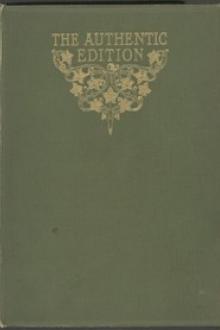The Clicking of Cuthbert by P. G. Wodehouse (acx book reading TXT) 📗

- Author: P. G. Wodehouse
Book online «The Clicking of Cuthbert by P. G. Wodehouse (acx book reading TXT) 📗». Author P. G. Wodehouse
"Exactly. And—you'll forgive me if I mention it—a player whose ball has fallen in the rough, may not pull up all the bushes within a radius of three feet."
"In fact, strict rules."
"Strict rules."
They shook hands without more words. And presently Peter walked out, and James, with a guilty look over his shoulder, took down Sandy MacBean's great work from the bookshelf and began to study the photograph of the short approach-shot showing Mr. MacBean swinging from Point A, through dotted line B-C, to Point D, his head the while remaining rigid at the spot marked with a cross. He felt a little guiltily that he had stolen a march on his friend, and that the contest was as good as over.
I cannot recall a lovelier summer day than that on which the great Todd-Willard eighteen-hole match took place. It had rained during the night, and now the sun shone down from a clear blue sky on to turf that glistened more greenly than the young grass of early spring. Butterflies flitted to and fro; birds sang merrily. In short, all Nature smiled. And it is to be doubted if Nature ever had a better excuse for smiling—or even laughing outright; for matches like that between James Todd and Peter Willard do not occur every day.
Whether it was that love had keyed them up, or whether hours of study of Braid's "Advanced Golf" and the Badminton Book had produced a belated effect, I cannot say; but both started off quite reasonably well. Our first hole, as you can see, is a bogey four, and James was dead on the pin in seven, leaving Peter, who had twice hit the United Kingdom with his mashie in mistake for the ball, a difficult putt for the half. Only one thing could happen when you left Peter a difficult putt; and James advanced to the lake hole one up, Peter, as he followed, trying to console himself with the thought that many of the best golfers prefer to lose the first hole and save themselves for a strong finish.
Peter and James had played over the lake hole so often that they had become accustomed to it, and had grown into the habit of sinking a ball or two as a preliminary formality with much the same stoicism displayed by those kings in ancient and superstitious times who used to fling jewellery into the sea to propitiate it before they took a voyage. But today, by one of those miracles without which golf would not be golf, each of them got over with his first shot—and not only over, but dead on the pin. Our "pro." himself could not have done better.
I think it was at this point that the two men began to go to pieces. They were in an excited frame of mind, and this thing unmanned them. You will no doubt recall Keats's poem about stout Cortez staring with eagle eyes at the Pacific while all his men gazed at each other with a wild surmise, silent upon a peak in Darien. Precisely so did Peter Willard and James Todd stare with eagle eyes at the second lake hole, and gaze at each other with a wild surmise, silent upon a tee in Woodhaven. They had dreamed of such a happening so often and woke to find the vision false, that at first they could not believe that the thing had actually occurred.
"I got over!" whispered James, in an awed voice.
"So did I!" muttered Peter.
"In one!"
"With my very first!"
They walked in silence round the edge of the lake, and holed out. One putt was enough for each, and they halved the hole with a two. Peter's previous record was eight, and James had once done a seven. There are times when strong men lose their self-control, and this was one of them. They reached the third tee in a daze, and it was here that mortification began to set in.
The third hole is another bogey four, up the hill and past the tree that serves as a direction-post, the hole itself being out of sight. On his day, James had often done it in ten and Peter in nine; but now they were unnerved. James, who had the honour, shook visibly as he addressed his ball. Three times he swung and only connected with the ozone; the fourth time he topped badly. The discs had been set back a little way, and James had the mournful distinction of breaking a record for the course by playing his fifth shot from the tee. It was a low, raking brassey-shot, which carried a heap of stones twenty feet to the right and finished in a furrow. Peter, meanwhile, had popped up a lofty ball which came to rest behind a stone.
It was now that the rigid rules governing this contest began to take their toll. Had they been playing an ordinary friendly round, each would have teed up on some convenient hillock and probably been past the tree with their second, for James would, in ordinary circumstances, have taken his drive back and regarded the strokes he had made as a little preliminary practice to get him into midseason form. But today it was war to the niblick, and neither man asked nor expected quarter. Peter's seventh shot dislodged the stone, leaving him a clear field, and James, with his eleventh, extricated himself from the furrow. Fifty feet from the tree James was eighteen, Peter twelve; but then the latter, as every golfer does at times, suddenly went right off his game. He hit the tree four times, then hooked into the sand-bunkers to the left of the hole. James, who had been playing a game that was steady without being brilliant, was on the green in twenty-six, Peter taking twenty-seven. Poor putting lost James the hole. Peter was down in thirty-three, but the pace was too hot for James. He missed a two-foot putt for the half, and they went to the fourth tee all square.
The fourth hole follows the curve of the road, on the other side of which are picturesque woods. It presents no difficulties to the expert, but it has pitfalls for the novice. The dashing player stands for a slice, while the more cautious are satisfied if they can clear the bunker that spans the fairway and lay their ball well out to the left, whence an iron shot will take them to the green. Peter and James combined the two policies. Peter aimed to the left and got a slice, and James, also aiming to the left, topped into the bunker. Peter, realizing from experience the futility of searching for his ball in the woods, drove a second, which also disappeared into the jungle, as did his third. By the time he had joined James in the bunker he had played his sixth.
It is the glorious uncertainty of golf that makes it the game it is. The fact that James and Peter, lying side by side in the same bunker, had played respectively one and six shots, might have induced an unthinking observer to fancy the chances of the former. And no doubt, had he not taken seven strokes to extricate himself from the pit, while his opponent, by some act of God, contrived to get out in two, James's chances might have been extremely rosy. As it was, the two men staggered out on to the fairway again with a score of eight apiece. Once past the bunker and round the bend of the road, the hole becomes simple. A judicious use of the cleek put Peter on the green in fourteen, while James, with a Braid iron, reached it in twelve.





Comments (0)